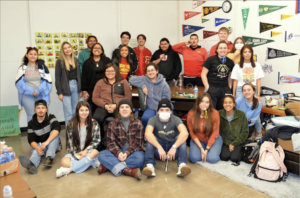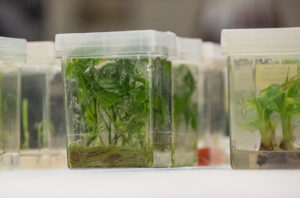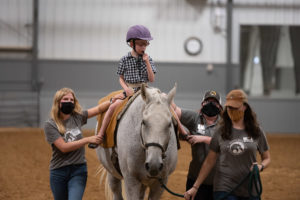Three new projects from the College of Agricultural Sciences will make their home at CSU Spur, Colorado State University’s new public-facing campus at Denver’s National Western Center. The new offerings join the college’s existing Spur programming and reflect CSU’s land-grant mission of access to education, centering on public engagement and providing life-long experiential learning opportunities.
Four departments and units from the college are represented in this most recent round of funding —the Department of Animal Sciences, the Department of Soil and Crop Sciences, the Department of Horticulture and Landscape Architecture, and the college’s student success team, which is housed in the Dean’s Office.
The Semilla Project — Serving Historically Marginalized Populations

Colorado State University is committed to increasing representation of women and minorities in STEM careers. The Semilla Project (semilla is Spanish for seed) aims to build a bridge between these ethnic and gender gaps through work-based learning experiences for youth populations. Focusing on historically underrepresented populations, this program will “plant the seed” early by developing and fostering relationships with students to promote diversity.
Led by Elias Quinonez, manager of student life and diversity for the College of Agricultural Sciences, this program will use interconnected high school and K-12 programs to enhance STEM participation among historically marginalized populations and provide a pipeline to CSU degree programs. With an intentional focus on first-generation, multicultural, and often limited-income students, it will aim to provide students and families with a high-impact educational experience.
To empower students to help solve the pressing global challenges the world faces today, three organizations will partner with the program: Colorado GEAR UP; Denver Public School’s Native American Culture Education; and the Jeffco Indian Education Program. Each of these organizations will provide students with STEM work-based learning experiences through campus visits and an intensive summer program.
Plant Genetic Diversity to Address Global Challenges

Plant genetic resources are any plant materials from which plants can be grown, such as seeds, cuttings, pollen or other tissue. Genetic diversity of these resources is critical to solving many global challenges, including the need for climate-resilient crops, feeding a growing population, more healthful diets, and environmentally friendly agricultural systems. CSU currently houses a globally significant repository of genetic resources, yet few people in the state are aware of its presence and role.
This project will develop outreach programming and educational resources focused on increasing awareness of the importance of plant genetic diversity in resilient and sustainable agriculture. Pat Byrne, a professor in the Department of Soil and Crop Sciences and Gayle Volk, a research plant physiologist with the USDA Agricultural Research Service and affiliate faculty member of the Department of Horticulture and Landscape Architecture, are leading the project.
Through hands-on activities, videos, greenhouse demonstrations and more, the program aims to spark interest in pursuing plant science degrees among urban and suburban K-12 students, as well as increase awareness and respect for different food traditions.
Equine-Assisted Therapy for Youth with Autism

Equine-assisted services include a range of activities and therapies that integrate the use of horses to promote human physical and mental health. They are the fastest-growing segment of the equine industry and youth with autism are the population most likely to receive these services. Yet, research providing scientific support for equine-assisted services for youth with autism remains in the early stages of scientific development.
Led by Caiti Peters, assistant professor in the Department of Animal Sciences, this project will study the use of horses in occupational therapy services for youth with autism aged 6–11. It will examine the preliminary efficacy of equine-assisted occupational therapy compared to traditional occupational therapy in a clinic. It also aims to explain how integrating horses into therapy impacts self-regulation in youth with autism by measuring the level of cortisol and other stress hormones in saliva samples from participants.
The study will take place at the Temple Grandin Equine Center at Spur and will recruit youth with autism who are Denver Public School elementary students or who live in the Denver Metro area. Research participants will receive 10 weeks of occupational therapy at TGEC Spur at no cost to them. Before the center, Denver youth had to drive long distances to rural suburbs in order to access equine-assisted services.